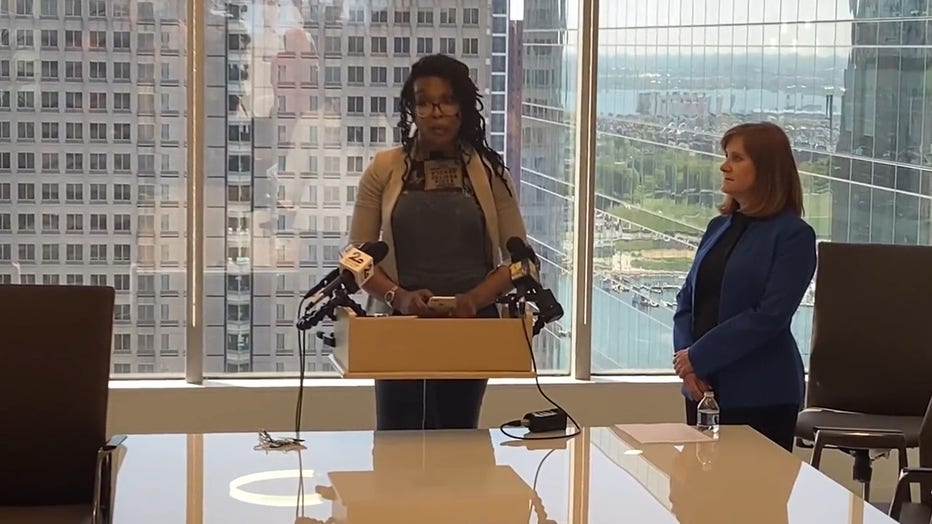Lawsuit: Trans woman sexually abused, harassed in Baltimore men’s jail
BALTIMORE, Md. - A transgender woman awaiting trial inside a Baltimore men’s jail facility was sexually assaulted at knifepoint by another prisoner, subjected to frequent ridicule and denied hormone therapy in what constituted cruel and unusual punishment, according to a federal lawsuit filed this week.
After the assault, Maryland corrections officials placed Chelsea Gilliam in solitary confinement for months, according to the lawsuit. She had been receiving hormone therapy for over 15 years before her incarceration, but Baltimore jail staff forced her to discontinue the treatment for the majority of her time behind bars.

(L) Chelsea Gilliam, (R) Eve Hill of Brown, Goldstein & Levy LLP
"When you become incarcerated, you not only lose your freedom but you lose your dignity and your sense of self," Gilliam said during a news conference Wednesday alongside her attorney. "I was treated like an alien … by inmates and staff — a local joke, day in and day out."
Gilliam’s case presents the latest example of transgender inmates suffering the consequences of a system that refuses to respect their rights, her attorney Eve Hill said at the news conference.
Across the country, transgender inmates are often incarcerated in facilities based on their sex assigned at birth, not their gender identity. Advocates say this is dangerous, particularly for transgender women held in custody with men.
A spokesperson for the Maryland Department of Public Safety and Correctional Services said the agency could not comment on pending litigation.
"We can say that the Department takes very seriously — and treats with urgency — the protection of every single incarcerated person’s dignity and safety," spokesperson Mark Vernarelli said in a statement. He said the agency has met with advocates from the transgender community and "is committed to updating its policies as necessary."
Initially arrested on an assault charge in December 2021, Gilliam was repeatedly held without bail pending trial, according to online court records. She spent nearly six months incarcerated before she pleaded guilty and was released on probation.

During her time behind bars, she endured frequent harassment and often feared for her safety, according to the lawsuit. In addition to monetary damages, she’s seeking court-ordered changes to policies and training for Maryland corrections staff.
In her experience, Gilliam said, asking to be transferred into a women’s facility was futile. Guards would simply respond: "You are a man and you are in jail," she wrote in the complaint.

PGCPS settles lawsuit with transgender teacher
After a four-year legal fight, a transgender former teacher has settled a lawsuit she brought against Prince George’s County Public Schools. FOX 5's Lindsay Watts has all the details!
Corrections staff never asked where she wanted to be housed — an omission that apparently violated department policy, which calls for serious consideration of an "inmate’s own views with respect to personal safety," according to the complaint.
Department policy also acknowledges that transgender prisoners, especially trans women, face a higher risk of sexual assault. But it says housing classification should be decided based on a person’s assigned sex at birth if they haven’t completed a "surgical gender reassignment" process — "regardless of how long they may have lived their life as a member of the opposite gender."
Though transgender prisoners are supposed to have access to separate showers, Gilliam was forced to undress in public, the complaint also said. She started avoiding the showers after a male prisoner sexually propositioned her; he later threatened her life and sexually assaulted her at knifepoint, the complaint says.
Even after she reported the assault, Gilliam said jail staff still didn’t let her shower alone. She was then transferred to another facility where she spent three months in segregation, which meant being locked up 23 hours per day and shackled whenever she left her cell, according to the lawsuit.
"It’s like they wanted me to pay for being trans. That’s what it felt like," she said.
All this occurred before she had even been convicted of a crime, her attorney said.
Hill said the case illustrates a larger pattern, both in Maryland and across the country, of transgender people being mistreated behind bars.
The Associated Press contributed to this report.


